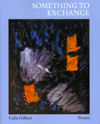Something to Exchange
In these beautifully crafted poems, Celia Gilbert explores love and loss and what it means to be a daughter and a Jew. There’s hardly a poem here that doesn’t ache with feeling.
In these beautifully crafted poems, Celia Gilbert explores love and loss and what it means to be a daughter and a Jew. There’s hardly a poem here that doesn’t ache with feeling.
The book has four parts, and by far the most powerful and effective is the second, which thematically recounts a daughter’s agonizing relationship with her dying mother. In “Stroke,” the daughter struggles to maintain a positive outlook: “I swear as long as you live I’ll believe / there is still time to tear you from the wreckage.” In “A Trick of the Light,” she says, “As a child grows to her full height, / slowly you descend to a final horizontal.” From “Yesterday”: “When a person is dying / all we have left is the will / to keep on loving what needs our love.”
Perhaps the most powerful poem in the sequence is “Necessity,” the necessity here being the mother’s transition to a nursing home. Any child who has experienced this can recognize the truth of Gilbert’s lines:
[M]y brother waited at the nursing home door
my proud, irascible brother so estranged from me.
He had wept. And then everything
let go. I cried unchecked for the pain
he bore for me and himself,
having to put you out of your home
where he had tenderly kept you for years.
Elsewhere in Something to Exchange, loss continues to be a theme, such as in “Coming Back”:
Sometimes
I hold your death in my hands,
a small stone I turn
over and over,
wanting to lick it to bring out the shine.
Finally, loss on a massive, unspeakable scale – “July 30, 1944” is introduced with the declarative statement, “The Lodz ghetto is dispersed to the death camps.” The poem is about “[t]he commodification of everything,” the voice third-person, the focus on an accountant who inventories everything left behind. What’s remarkable about the poem is Gilbert’s freedom to list things bluntly, unpoetically:
Received in the ghetto by the end of May, 1942:
clothing and rags, 798,625 kilos;
feathers, eiderdown, and pillows, 221,035;
furs and hides, 8,130 kilos;
used shoes, 69,350 kilos;
used neckties, 12 kilos.
The accountant finds a strange beauty, an “actuarial gratification / of the sanitary numbers, the columns so beautiful / in themselves.” One is reminded of the columns of victims being led to the waiting trains: “They cannot move except carried over / to the next page and the next column.”
Not everything in Something to Exchange is gloom and doom. Yet even passages of joy are tempered by authority, as in “Findings,” when the speaker’s grandfather wants the firehouse to sound its alarm in rejoicing on Armistice Day, only to be told it was illegal and would result in a fine. But “you agreed to pay – / on behalf of your fellow townsfolk, / your new country, your promised new world.”





